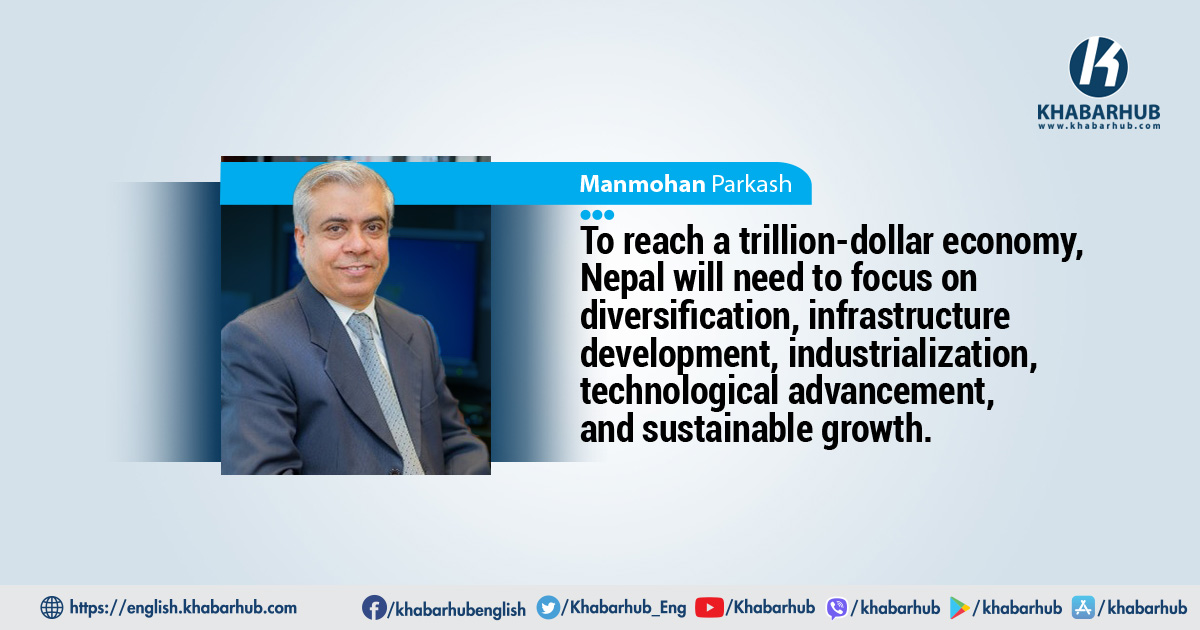Nepal’s current GDP is around $40 billion, and transitioning to a trillion-dollar economy requires an extraordinary and sustained transformation across multiple sectors.
The country needs growth rates and structural changes that far exceed current levels.
Achieving this ambitious goal will involve strategic planning, policy reforms, investments, and leveraging Nepal’s unique geographical, economic, and cultural position in South Asia.
This piece summarizes the key steps and strategies Nepal could adopt to achieve this goal.
Achieving High and Sustained Economic Growth
Growth Target: To reach a trillion-dollar GDP, Nepal would need to sustain high growth rates for several decades.
This would require annual growth rates of around 10-12% for 30-40 years, which is achievable but demands strong and consistent policy implementation.
Diversification: Currently, Nepal’s economy is heavily reliant on agriculture (about 30% of GDP), followed by remittances and tourism.
Diversifying into other sectors such as manufacturing, services, technology, and infrastructure would be crucial.
Boosting Infrastructure Development
Transportation: Expanding transportation infrastructure—roads, railways, and airports—would be fundamental.
By capitalizing on its geographical location, human capital, natural resources, and fostering regional cooperation, Nepal can work towards achieving this goal, although it will take decades of sustained effort and growth across all sectors of the economy.
A modern, connected, and efficient transportation network can facilitate trade, tourism, and regional integration.
Energy: Nepal has vast potential in hydropower, which could become a key export, especially to neighboring countries like India and China.
By investing in renewable energy infrastructure, Nepal could address its energy deficit and export surplus power, which could become a significant revenue stream.
Smart Cities and Urbanization: Building smart, sustainable cities connected to global trade hubs will boost productivity and create new opportunities for industries.
Investment in Human Capital
Education and Skills Development: Investing in human capital is crucial. Nepal needs to improve its education system to prepare a skilled workforce that can drive growth in high-tech, service, and manufacturing sectors.
Healthcare: Improving healthcare will not only increase life expectancy but also lead to a more productive workforce. Access to quality healthcare is also important to attract global talent and investment.
Leveraging Technology and Innovation
Digital Economy: Encouraging the growth of the digital economy can have a transformative effect on Nepal’s GDP.
This includes promoting tech startups, e-commerce, digital banking, and the use of AI and blockchain technologies.
Innovation Hubs: Focusing on building innovation hubs or technology parks will help attract global tech companies and foster local entrepreneurs.
Nepal has a young, tech-savvy population, which could be a significant advantage in this regard.
E-Government and Smart Policies: Modernizing government processes through digital tools could improve efficiency, reduce corruption, and make doing business in Nepal easier.
Boosting Exports and Trade
Expanding Export Markets: Nepal has traditionally relied on India as its main trading partner.
To reach a trillion-dollar economy, Nepal will need to diversify its exports, focusing on both goods and services to existing and new markets. This includes products like garments, handicrafts, tea, and organic food.
Regional Trade Agreements: Nepal should continue to engage with regional organizations like SAARC and BIMSTEC and explore free trade agreements (FTAs) with larger economies such as China, Japan, and ASEAN countries to expand its global trade footprint.
Exporting Hydropower: Nepal has immense potential in hydropower generation. Exporting power to neighboring countries like India and China could become a major economic driver.
With improved infrastructure, Nepal could become a net exporter of energy in South Asia.
Industrialization and Manufacturing
Developing Manufacturing Capabilities: Nepal should aim to build a competitive manufacturing sector that can serve both domestic needs and export markets.
Key industries could include textiles, food processing, pharmaceuticals, and construction materials.
Attracting Foreign Direct Investment (FDI): Nepal needs to create an investor-friendly climate through incentives, easing bureaucratic hurdles, and improving the ease of doing business to attract FDI.
Climate Change Adaptation: Nepal’s vulnerability to climate change, particularly in the Himalayan region, requires investments in climate resilience projects, disaster management, and sustainable agriculture.
FDI can help industrialize Nepal by bringing in capital, technology, and expertise.
Tourism and Hospitality
Leveraging Nepal’s Natural and Cultural Assets: Tourism is already a key contributor to Nepal’s economy, but it has the potential to grow significantly.
Nepal could position itself as a global tourist destination for adventure tourism (mountaineering, trekking), eco-tourism, wellness tourism, and cultural heritage tourism.
Infrastructure for Tourism: Developing world-class hotels, resorts, and airports, particularly in cities like Kathmandu, Pokhara, and Lumbini (the birthplace of Buddha), could attract millions of international visitors annually.
Improving Governance and Reducing Corruption
Strengthening Institutions: A strong, transparent, and accountable government is essential for economic growth.
Nepal needs to focus on better governance practices, reducing corruption, and ensuring that public funds are used efficiently for infrastructure development and social welfare.
Legal Reforms: Simplifying legal and regulatory frameworks for businesses, protecting property rights, and enforcing contracts will create a conducive environment for entrepreneurship and foreign investment.
Regional Cooperation
Strategic Location: Nepal’s geographical position, bordered by two of the world’s largest economies, India and China, offers immense trade potential.
By fostering closer economic and trade relations with both countries, Nepal could benefit from their rapid growth.
Connectivity Initiatives: By joining initiatives like China’s Belt and Road Initiative (BRI) or collaborating with India on cross-border infrastructure projects, Nepal can improve connectivity with global markets and regional hubs.
Sustainable Development
Green Economy: Emphasizing sustainability in development is crucial. By focusing on renewable energy, waste management, and eco-friendly industrial practices, Nepal could develop a green economy that would attract international support and investment.
Climate Change Adaptation: Nepal’s vulnerability to climate change, particularly in the Himalayan region, requires investments in climate resilience projects, disaster management, and sustainable agriculture.
In conclusion, to reach a trillion-dollar economy, Nepal will need to focus on diversification, infrastructure development, industrialization, technological advancement, and sustainable growth.
This ambitious target requires long-term planning, substantial investment, and strong institutional frameworks.
By capitalizing on its geographical location, human capital, natural resources, and fostering regional cooperation, Nepal can work towards achieving this goal, although it will take decades of sustained effort and growth across all sectors of the economy.
(Manmohan Parkash is a former Senior Advisor, Office of the President, and Deputy Director General, South Asia, Asian Development Bank.)









Comment